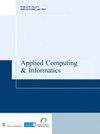WisdomModel: convert data into wisdom
IF 4.9
Q1 COMPUTER SCIENCE, INFORMATION SYSTEMS
引用次数: 1
Abstract
PurposeTraditional classification algorithms always have an incorrect prediction. As the misclassification rate increases, the usefulness of the learning model decreases. This paper presents the development of a wisdom framework that reduces the error rate to less than 3% without human intervention.Design/methodology/approachThe proposed WisdomModel consists of four stages: build a classifier, isolate the misclassified instances, construct an automated knowledge base for the misclassified instances and rectify incorrect prediction. This approach will identify misclassified instances by comparing them against the knowledge base. If an instance is close to a rule in the knowledge base by a certain threshold, then this instance is considered misclassified.FindingsThe authors have evaluated the WisdomModel using different measures such as accuracy, recall, precision, f-measure, receiver operating characteristics (ROC) curve, area under the curve (AUC) and error rate with various data sets to prove its ability to generalize without human involvement. The results of the proposed model minimize the number of misclassified instances by at least 70% and increase the accuracy of the model minimally by 7%.Originality/valueThis research focuses on defining wisdom in practical applications. Despite of the development in information system, there is still no framework or algorithm that can be used to extract wisdom from data. This research will build a general wisdom framework that can be used in any domain to reach wisdom.WisdomModel:将数据转化为智慧
目的传统的分类算法往往存在不正确的预测。随着错误分类率的增加,学习模型的有用性降低。本文提出了一种智能框架的开发,可以在没有人为干预的情况下将错误率降低到3%以下。设计/方法/方法提出的WisdomModel包括四个阶段:建立分类器、隔离错误分类实例、为错误分类实例构建自动化知识库和纠正错误预测。这种方法将通过与知识库进行比较来识别错误分类的实例。如果一个实例与知识库中的规则接近某一阈值,则认为该实例分类错误。作者使用不同的测量方法,如准确性、召回率、精密度、f-measure、受试者工作特征(ROC)曲线、曲线下面积(AUC)和错误率,对WisdomModel进行了评估,以证明其在没有人类参与的情况下进行泛化的能力。该模型的结果将错误分类实例的数量减少了至少70%,并将模型的准确率最低提高了7%。独创性/价值本研究侧重于在实际应用中定义智慧。尽管信息系统的发展日新月异,但从数据中提取智慧的框架和算法仍然缺乏。这项研究将建立一个通用的智慧框架,可以在任何领域使用,以达到智慧。
本文章由计算机程序翻译,如有差异,请以英文原文为准。
求助全文
约1分钟内获得全文
求助全文
来源期刊

Applied Computing and Informatics
Computer Science-Information Systems
CiteScore
12.20
自引率
0.00%
发文量
0
审稿时长
39 weeks
期刊介绍:
Applied Computing and Informatics aims to be timely in disseminating leading-edge knowledge to researchers, practitioners and academics whose interest is in the latest developments in applied computing and information systems concepts, strategies, practices, tools and technologies. In particular, the journal encourages research studies that have significant contributions to make to the continuous development and improvement of IT practices in the Kingdom of Saudi Arabia and other countries. By doing so, the journal attempts to bridge the gap between the academic and industrial community, and therefore, welcomes theoretically grounded, methodologically sound research studies that address various IT-related problems and innovations of an applied nature. The journal will serve as a forum for practitioners, researchers, managers and IT policy makers to share their knowledge and experience in the design, development, implementation, management and evaluation of various IT applications. Contributions may deal with, but are not limited to: • Internet and E-Commerce Architecture, Infrastructure, Models, Deployment Strategies and Methodologies. • E-Business and E-Government Adoption. • Mobile Commerce and their Applications. • Applied Telecommunication Networks. • Software Engineering Approaches, Methodologies, Techniques, and Tools. • Applied Data Mining and Warehousing. • Information Strategic Planning and Recourse Management. • Applied Wireless Computing. • Enterprise Resource Planning Systems. • IT Education. • Societal, Cultural, and Ethical Issues of IT. • Policy, Legal and Global Issues of IT. • Enterprise Database Technology.
 求助内容:
求助内容: 应助结果提醒方式:
应助结果提醒方式:


